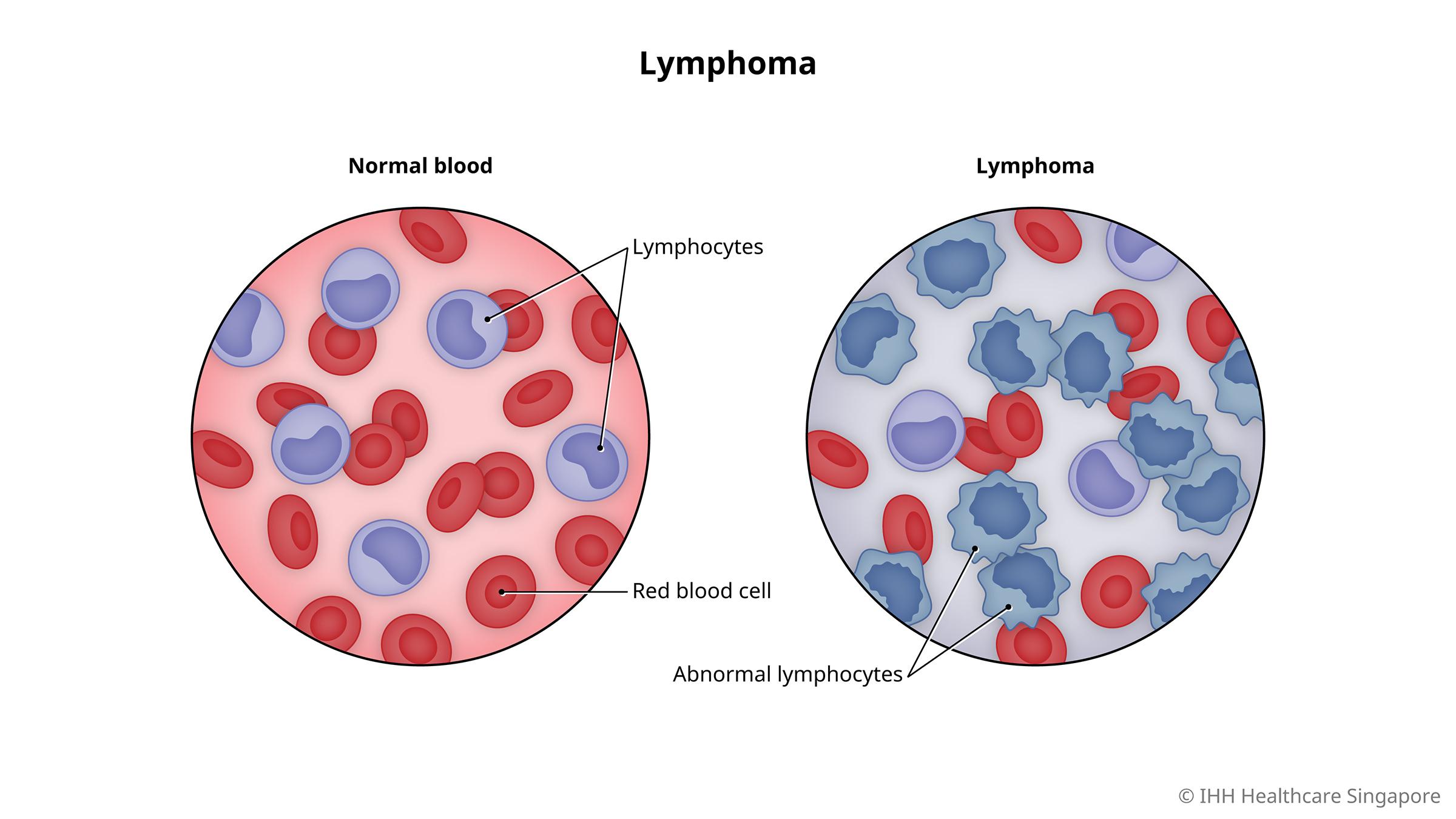
Lymphoma
What is lymphoma?
Lymphoma is a type of blood cancer that affects lymphocytes, the white blood cells that form part of the immune system that helps fight infections.
In lymphoma, either the B lymphocytes (B-cells) or T lymphocytes (T-cells) undergo a harmful change and grow out of control. These abnormal lymphocytes crowd out the healthy cells, affecting the normal functioning of the immune system.
Types of lymphoma
The main types of lymphoma are Hodgkin's lymphoma (common in young adults who are 15 – 30 years old and adults over 50) and non-Hodgkin's lymphoma (more common in older people).
Hodgkin's lymphoma
Several types of Hodgkin's lymphoma exist, which may include rarer forms that are difficult to identify. The subtypes of lymphoma include:
- Nodular sclerosis – More common in young adults than in other age groups
- Lymphocyte-rich – More common in men
- Lymphocyte-depleted – More rare and aggressive
- Mixed cellularity – More prevalent in adult men
In developing a treatment plan, accurate diagnosis and staging is important in shaping a treatment plan. The general stages of lymphoma are:
- Stage I – Lymphoma occurs in 1 lymph node, a group of lymph nodes, or 1 organ
- Stage II – Lymphoma occurs in 2 or more lymph node regions, or when it has invaded an organ and the nearby lymph nodes. The cancer sites are still limited to the same side of the diaphragm.
- Stage III – The cancer occurs on both sides of the diaphragm
- Stage IV – The cancer occurs in several sites in 1 or more organs and tissues. This is the most advanced stage of Hodgkin's lymphoma, and affects not only the lymph nodes but also other parts of the body, such as the liver, lungs or bones.
Non-Hodgkin's lymphoma
This is a heterogeneous group of malignancies of the lymphoid system. The most common non-Hodgkin's lymphoma is the diffuse large B-cell lymphoma.
The staging of the non-Hodgkin's lymphoma is similar to Hodgkin's lymphoma.
What are the symptoms of lymphoma?
While the signs and symptoms of lymphoma may not be easily noticeable, some common ones include:
- Enlarged (swollen) lymph glands
- Chronic tiredness
- Fever
- Night sweats
- Shortness of breath
- Unexplained weight loss
- Skin irritation or itchiness
What causes lymphoma?
While the exact cause of lymphoma is unknown, some risk factors may increase the chances of developing it.
What are the risk factors for lymphoma?
Risk factors for lymphoma may include:
- Age – Some types of lymphoma are more common in young adults, while others are most often diagnosed in people aged 5 and above
- Male gender
- Having an impaired immune system
- Infections (eg. Epstein-Barr virus and Helicobacter pylori infection)
- Genetic disorders (eg. Wiskott-Aldrich syndrome)
What are the complications and related diseases of lymphoma?
Lymphoma and its treatments can cause some complications and diseases, including:
Infections
Lymphoma can weaken your immune system. With a weak immune system, you are at a higher risk of having infections. To prevent serious complications, talk to your doctor if you experience symptoms of an infection such as fever, headache, muscle pains, diarrhoea, fatigue, and painful blistering rashes.
Heart diseases
Treatments of lymphoma such as chemotherapy and radiation therapy can lead to heart complications. Doxorubicin, the drug used in chemotherapy, can cause the heart muscle to weaken. Radiation therapy can also damage the heart. These treatments increase your risk of developing congestive heart failure, heart attack, and stroke.
Respiratory problems
Lymphoma treatments can increase your risk of developing respiratory complications. For instance, radiotherapy and a chemotherapy drug called bleomycin can lead to scarring of the lungs.
Infertility
Treatments such as chemotherapy and radiotherapy can cause temporary and permanent infertility. If you still plan to have a baby in the future, ask your doctor about your options. For men, the option can include storing samples of sperm. Women, on the other hand, can opt to store eggs before undergoing lymphoma treatments.
This coverage checker is brought to you by Health Insured, an online resource that helps you understand your health coverage in Singapore.
This page has been reviewed by our medical content reviewers.
Need help?
For enquiries, please call
+65 6250 0000 (Orchard) or +65 6898 6898 (Novena)
For appointment bookings, please WhatsApp
+65 8111 7777 (Orchard) or +65 8111 5777 (Novena)
 Brain & Spine Care
Brain & Spine Care



